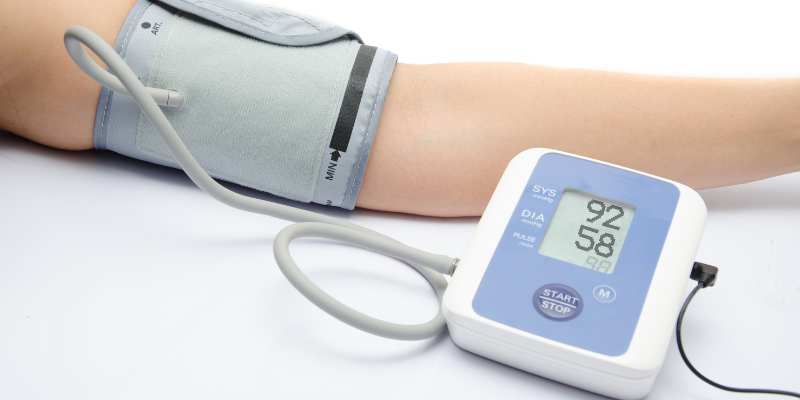Hypertension, another name for high blood pressure, is a severe medical disorder that affects millions of individuals worldwide. Because it usually shows no symptoms, high blood pressure is sometimes called the "silent killer." If left unchecked, however, it can cause serious health problems, including heart disease, stroke, kidney damage, and even death. Nearly 1.28 billion persons between the ages of 30 and 79 globally have hypertension, according to the World Health Organization (WHO), although a sizable percentage go misdiagnosed or untreated.
Controlling your blood pressure is crucial to maintaining your health. This article will examine several potentially life-saving techniques for properly managing blood pressure. By being aware of these methods, you may take immediate action to protect your health.
Adopt a Comprehensive Nutrition Plan:
The Mediterranean Diet: Reduced blood pressure is linked to the Mediterranean diet and is vital in fruits, vegetables, whole grains, nuts, and healthy fats.
Important Components:
- Healthy Fats: Include fatty seafood, such as salmon and sardines, for omega-3 fatty acids, and use olive oil as your primary source of fat.
- Rich in Antioxidants: Legumes, leafy greens, and berries all support improved cardiac health.
- Moderate Wine Consumption: If you're a drinker, consider consuming red wine in moderation since it's connected to heart health.
The Flexitarians Diet: While focusing primarily on plant-based foods, this mostly vegetarian diet permits occasional ingestion of meat and fish. Rich in minerals, vitamins, and fiber, it may help decrease blood pressure. It aids in weight loss and enhances cardiovascular health in general.
Functional Foods: Include functional foods that offer health advantages above purely nutritional ones. Several noteworthy instances consist of the following:
- Beetroot: Nitrates in beetroot may help widen blood vessels, enhance blood flow, and reduce blood pressure.
- Dark Chocolate: Look for kinds with at least 70% cocoa content; they are rich in flavonoids, which have been demonstrated to decrease blood pressure.
- Fermented Foods: Foods high in probiotics, such as kimchi, kefir, and yoghurt, have been shown to decrease blood pressure and enhance intestinal health.
Maximize Exercise Using Innovative Methods:
- HIIT, or High-Intensity Interval Training: Short bursts of intensive activity are interspersed with rest or low-intensity intervals in this type of training. Research indicates that high-intensity interval training (HIIT) can enhance cardiovascular fitness and lower blood pressure more rapidly than conventional endurance training. Twice a week, dedicate 20 to 30 minutes to high-intensity interval training (HIIT) sessions incorporating activities such as circuit training, cycling, and sprinting.
- Body-Mind Exercises: Take part in mind-body exercises like Qigong and Tai Chi. These exercises can help decrease blood pressure and reduce stress by emphasizing slow, deliberate movements, deep breathing, and awareness.
- Integration of an Active Lifestyle: Increase your everyday physical activity without doing structured workouts. When spending a lot of time sitting still, take little pauses to stretch or go for a stroll. If feasible, take meetings while standing or while strolling.

Use Technology to Control Blood Pressure:
- Mobile Apps for Health: Use applications for health and fitness to monitor your blood pressure, nutrition, and physical activity. Sticking to your management plan is made more accessible by the several applications that assist in tracking lifestyle changes and serve as medication reminders.
- Wearable Technology: Think about utilizing wearable fitness trackers and smartwatches that track your heart rate and degree of exercise. Specific gadgets include blood pressure monitoring, which gives you immediate feedback on your health metrics and advancement.
- Services for Telehealth: For routine consultations with medical professionals, use telehealth platforms. Nutritional guidance, lifestyle coaching, and medication management can all be facilitated by having online access to medical specialists.
Use Cutting-Edge Stress Reduction Strategies:
- Biofeedback Treatment: Real-time feedback is used in the biofeedback approach to educate you on how to control physiological functions. People can successfully reduce their blood pressure by developing the ability to control their stress responses. For advice, think about consulting a licensed biofeedback therapist.
- Nature-Based Therapy: Spending time in natural settings has lowered blood pressure and reduced stress. Enjoy hobbies like hiking, gardening, or strolling in a park to benefit from nature's soothing benefits.

- Laughter Therapy: Laughter lowers blood pressure by increasing blood flow and reducing stress chemicals. Laughing yoga, hilarious movies, and comedic programs are great ways to add humor to your life.
Make Sleep Hygiene a Priority:
- Insomnia Treatment with Cognitive Behavioral Therapy (CBT-I): This systematic treatment assists in addressing the ideas and actions that lead to sleep problems. Maximizing the use of electronic devices before bed and investing in comfy bedding can improve the quality of your sleep.
Examine Alternative and Complementary Therapies:
- Acupuncture: This traditional Chinese medicine practice uses tiny needles inserted into specific body locations. According to research, acupuncture may help reduce blood pressure and enhance general health.
- Supplements with Herbs: Certain herbal medicines might help with controlling blood pressure. Research indicates that drinking hibiscus tea can lower your blood pressure's systolic level.
- Garlic Supplements: Studies have shown that garlic supplements can lower blood pressure. Before beginning any supplements, see a doctor, mainly if you use blood pressure medication.
Encourage Social Networking and Community Involvement:
- Social Media Support Systems: Your health and well-being can be significantly impacted by having strong social ties. To expand your social circle and source of emotional support, sign up for organizations, community classes, or support groups that share your interests.
- Volunteering: Volunteering has been shown to improve mental health and well-being, which is advantageous for controlling blood pressure. Giving to others can lower stress levels and provide a feeling of purpose.
Conclusion
The multimodal management of high blood pressure requires dedication and lifestyle modifications. You may take significant steps toward managing your hypertension by implementing cutting-edge ideas, such as adopting a thorough nutritional framework, optimizing physical activity, utilizing technology, and incorporating stress management approaches.
Now is the time to act; start implementing these innovative strategies into your everyday routine. Consult a doctor to create a customized blood pressure control strategy that meets your requirements. Recall that proactive management can raise your quality of life overall and dramatically lower your chance of developing major health problems.







